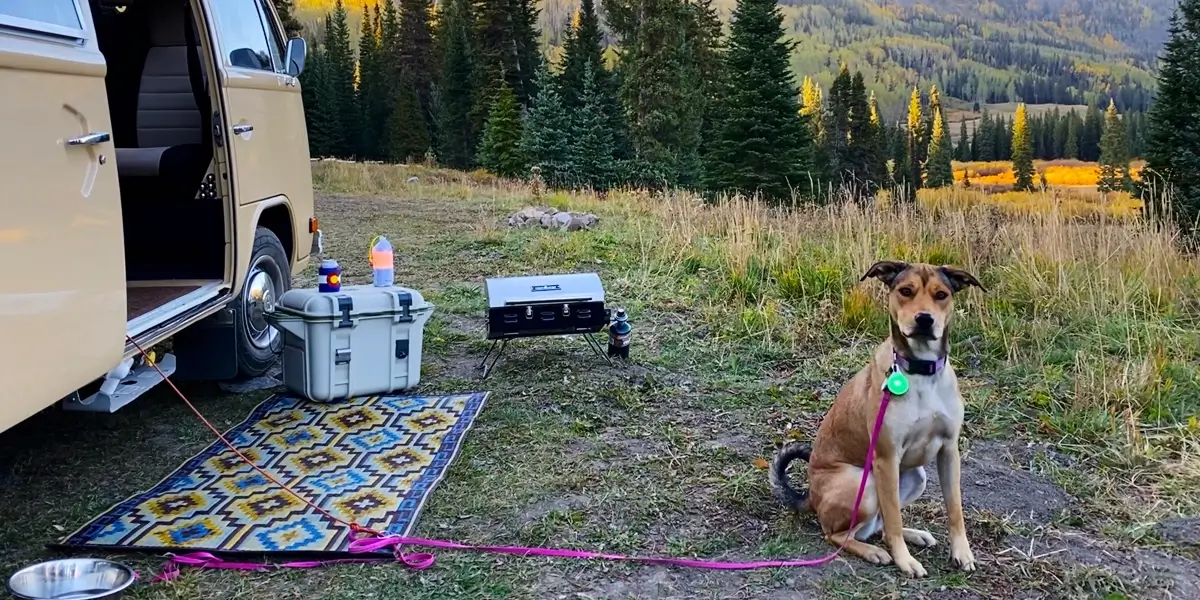Camping with dogs can be a delightful adventure, offering the perfect opportunity to bond with your furry friend while enjoying the great outdoors. However, a successful camping trip with your canine companion requires careful planning and preparation. In this guide, we’ll cover everything you need to know to ensure a safe and enjoyable camping experience for you and your dog. We’ll also touch upon the importance of veterinary care when venturing into the wilderness with your four-legged friend.
Choosing the Right Campground
Selecting the right campground is crucial when camping with your dog. Start by researching dog-friendly campgrounds, as not all of them allow pets. Look for locations that have dog-friendly amenities, such as designated dog areas, water sources, and waste disposal facilities. National and state parks and some private campgrounds often welcome dogs, but specific rules and regulations may apply. Always check in advance to avoid any surprises on your trip.
Preparation Is Key
Proper preparation is the cornerstone of a successful camping trip with your dog. Before heading out, make sure to:
- Check your dog’s health: Schedule a vet visit to ensure your dog is up to date on vaccinations and in good health. Discuss flea and tick prevention as well.
- Pack essentials: Don’t forget to bring your dog’s necessities, such as food, water, bowls, leash, collar with ID tags, poop bags, a first-aid kit, and any medications your dog may need.
- Training: Ensure your dog has basic obedience skills, making the trip more enjoyable for you and your pet. Practice commands like “sit,” “stay,” and “come” before you leave.
- Gear: Consider investing in dog-specific camping gear, like a doggy backpack for carrying their supplies, a comfortable sleeping pad, and a reflective leash and collar for nighttime walks.
- Campsite etiquette: Respect other campers by always keeping your dog on a leash. Ensure your dog doesn’t disturb the wildlife or negatively impact the environment.
Safety in the Wilderness
Camping in the great outdoors presents unique challenges and potential dangers for both you and your dog. Here are some safety tips to keep in mind:
- Wildlife encounters: Be prepared for encounters with wildlife. Keep your dog on a leash and avoid areas with known wildlife activity. Carry bear spray if necessary, and educate yourself about the wildlife in the area.
- Poisonous plants: Familiarize yourself with local plants and wildflowers that could harm your dog. Certain plants can be toxic, so keep your pet from unfamiliar vegetation.
- Water safety: If your camping trip includes water activities, be aware of your dog’s swimming abilities. Some dogs are natural swimmers, while others may need a life jacket for safety. Always supervise your dog when near water.
- Weather conditions: Check the weather forecast and be prepared for sudden weather changes. Extreme heat or cold can be dangerous for your dog, so pack accordingly with gear like cooling vests or insulated coats.
- Insects and parasites: Protect your dog from ticks, fleas, and mosquitoes. Use appropriate repellents, and regularly check your dog for ticks, especially in wooded areas.
- First aid: Bring a pet-specific first-aid kit and know how to use it. Be prepared to address minor injuries on the trail, such as cuts or scrapes.
The Importance of Veterinary Care
While camping with your dog, being mindful of their health and well-being is essential. Regular veterinary care ensures your dog is fit for outdoor adventures. Here are some key points to consider:
- Pre-Camping Vet Visit: Before embarking on your camping trip, visit the vet. During this check-up, your veterinarian can assess your dog’s overall health, administer necessary vaccinations, and recommend preventive measures for potential outdoor hazards, such as parasites. These treatments are available at Saltwater Vets.
- Vaccinations: Ensure your dog is current on essential vaccinations. Depending on the location and planned activities, your vet might recommend additional vaccinations to protect your dog from specific diseases.
- Parasite Prevention: Your dog is more exposed to parasites like ticks and fleas in the wilderness. Your vet can provide appropriate preventive measures and treatments to keep these pests at bay.
- Emergency Contact: Before leaving for your camping trip, ask your veterinarian for an emergency contact number if you encounter health-related issues with your dog while away from home. Being prepared in advance can be a lifesaver in critical situations.
- Identification: Double-check that your dog wears a collar with accurate ID tags. Microchipping is an excellent additional measure to ensure your dog can be identified and returned to you if lost during the camping trip.
- First-Aid Kit: Include essential veterinary supplies in your first-aid kit, like antiseptic wipes, bandages, and any medications your dog may require. Your vet can guide you on what specific items to include.
Camping with dogs can be a memorable and fulfilling experience for you and your furry friend. You can create wonderful memories in the great outdoors by choosing the right campground, preparing adequately, and following safety guidelines. Veterinary care is fundamental to your dog’s well-being during camping adventures. Addressing your dog’s health needs in advance and staying vigilant during your trip can ensure a safe and enjoyable camping experience for you and your beloved companion.

